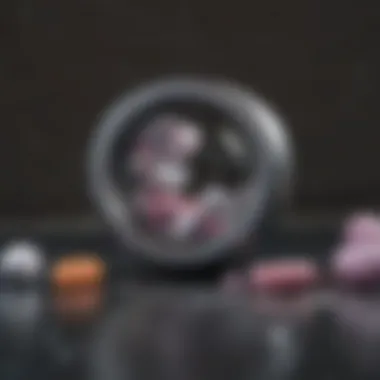Unlocking the Art of Crafting Your Own Pills: A Complete Guide to DIY Medication Creation


Research Overview
Making your own pills is a meticulous and intriguing process that allows individuals to craft custom medications tailored to their specific needs. This comprehensive guide delves into the various facets of DIY pill-making, from the essential steps involved, to the necessary equipment required, and the potential benefits of this pharmaceutical self-production approach.
Health Implications
The impact of making your own pills on health is a crucial aspect to consider. By creating custom medications, individuals can potentially ensure a more precise dosage and tailor the medications to suit their unique requirements, thus potentially improving treatment effectiveness. However, it is important to note the associated risks, such as incorrect dosages or contamination. Understanding the benefits and risks of this practice is essential in making an informed decision regarding DIY pill-making.
Well-being Strategies
Incorporating DIY pill-making into daily life requires careful consideration and adherence to best practices. Practical tips include obtaining high-quality ingredients, utilizing accurate measuring equipment, and maintaining sterility throughout the process to ensure the safety and efficacy of the final product. Implementing positive changes for well-being through DIY pill-making involves meticulous attention to detail and a commitment to pharmaceutical self-production standards.
Expert Insights
Experts in the field of pharmacy provide valuable insights into the world of DIY pill-making. By analyzing research findings and navigating potential health implications, professionals offer guidance on best practices and safety measures to follow when embarking on the journey of creating custom medications at home. A Q&A session with a relevant expert can further delve into the nuances of pharmaceutical self-production, addressing common concerns and providing expert recommendations.
Introduction
Making your own pills offers a unique exploration into the world of pharmaceutical self-production, where individuals can craft personalized medications for their specific needs. This comprehensive guide aims to delve deep into the steps, equipment requirements, and potential benefits of this intriguing DIY approach. By empowering individuals to take control of their medication creation, it opens up new possibilities for customized healthcare solutions.
Understanding the Concept of Making Your Own Pills
The Rise of DIY Pharmaceutical Practices
The rise of DIY pharmaceutical practices signifies a shift towards self-sufficiency in medication creation. This aspect explores how individuals are increasingly taking charge of their health by producing their pills. The key characteristic lies in the hands-on approach to healthcare, allowing for tailored solutions to individual needs. The unique feature of this practice is the autonomy it provides in medication customization, although attention must be paid to proper research and safety considerations.
Benefits of Crafting Personalized Medications
Crafting personalized medications offers a range of benefits, including precise dosing and tailored formulations. This aspect highlights how personalized medications cater directly to an individual's requirements, ensuring optimal effectiveness. The key characteristic of this practice is its ability to address specific health needs with accuracy, promoting better outcomes. While advantageous in providing tailored solutions, challenges such as dosage complexity may arise, emphasizing the importance of thorough research and education.
Importance of Proper Research and Education
Exploring Safety Considerations
Exploring safety considerations is crucial in the pill-making process to ensure the quality and efficacy of the medications produced. This aspect emphasizes the significance of adhering to safety protocols and standards to mitigate risks. The key characteristic lies in understanding potential hazards in the pill-making process and implementing preventative measures. While promoting safety is essential, overlooking safety considerations can lead to contamination issues, underlining the need for thorough research.


Learning about Dosage Calculation
Understanding dosage calculation is fundamental in creating effective medications tailored to individual needs. This aspect delves into the precision required in calculating dosages to uphold safety and efficacy. The key characteristic involves mastering the art of dosage calculation to deliver accurate and potent medications. While advantageous in ensuring proper medication dosing, complexities in dosage formulation can pose challenges, highlighting the importance of continuous education and skill enhancement.
Getting Started
In the realm of pharmaceutical self-production, the initial steps hold pivotal importance as they lay the foundation for the pill-making journey. Getting started involves more than just gathering tools and materials; it signifies a commitment to precision, safety, and understanding the intricacies of personalized medication crafting. This section serves as a launching pad for individuals venturing into the world of DIY pill-making, offering a comprehensive overview of the essentials necessary to embark on this innovative path.
Essential Tools and Equipment
Pill Press Machine
When delving into the realm of pharmaceutical self-production, the pill press machine emerges as a cornerstone tool that simplifies the pill-making process. This device, characterized by its ability to compact powdered ingredients into coherent pills, streamlines production and ensures uniformity in dosage and shape. The inherent efficiency of the pill press machine makes it a favored choice for individuals seeking a precise and controlled method of creating custom medications at home. Its unique feature lies in its ability to transform loose ingredients into standardized pills, providing a reproducible means of medication preparation. While offering enhanced accuracy and consistency, the pill press machine demands careful calibration and maintenance to optimize its functionality.
Mixing Trays and Utensils
In the landscape of DIY pharmaceutical practices, mixing trays and utensils play a vital role in facilitating the accurate blending of ingredients. These tools, distinguished by their capacity to ensure thorough mixing and homogeneity of components, contribute to the overall quality of the final product. The key characteristic of mixing trays and utensils lies in their versatility and utility, enabling individuals to create customized medication formulations with precision. Their unique feature includes specialized designs that promote efficient blending and distribution of ingredients, enhancing the efficacy of the pill-making process. While offering increased control over ingredient proportions, mixing trays and utensils require diligent cleansing and sterilization to prevent contamination and maintain product purity.
Raw Materials and Ingredients
Central to the pill-making process are the raw materials and ingredients employed in formulating customized medications. These components, characterized by their purity and compatibility, determine the quality and effectiveness of the final product. The key characteristic of raw materials and ingredients lies in their therapeutic attributes and pharmacological profiles, influencing the safety and efficacy of the custom medication. Their unique feature encompasses a range of chemical compounds and excipients that interact synergistically to produce the desired therapeutic outcomes. While offering flexibility in designing personalized formulations, raw materials and ingredients necessitate meticulous sourcing and storage to preserve their integrity and maximize shelf life.
Setting Up Your Workstation
Initiating the pill-making endeavor involves configuring a workstation that promotes efficiency, hygiene, and systematic organization. This preparatory phase is crucial in ensuring a conducive environment for pharmaceutical self-production, wherein cleanliness and accessibility are paramount considerations. Establishing an ergonomic and sanitary workspace sets the stage for seamless pill creation, fostering precision and adherence to safety protocols. This section delineates the essential aspects of workstation setup, emphasizing the significance of maintaining strict standards to uphold the integrity and quality of custom medications.
Ensuring Cleanliness and Hygiene
A fundamental aspect of setting up your workstation for pill-making entails prioritizing cleanliness and hygiene to mitigate the risk of contamination and ensure product safety. This meticulous approach involves sanitizing surfaces, tools, and equipment, minimizing microbial presence to safeguard the purity of the medication. The key characteristic of ensuring cleanliness and hygiene lies in its role as a preventive measure against potential cross-contamination and microbial growth, safeguarding the integrity of the final product. Its unique feature encompasses stringent cleanliness protocols and disinfection practices that uphold pharmaceutical standards and support product efficacy. While promoting a sterile working environment, ensuring cleanliness and hygiene necessitates attention to detail and adherence to established sterilization principles.
Organizing Supplies for Efficiency
Efficient organization of supplies stands as a critical component of workstation setup, enhancing productivity and workflow optimization during the pill-making process. Organizational prowess ensures easy access to tools and materials, streamlining production tasks and minimizing errors or delays. The key characteristic of organizing supplies for efficiency lies in its capacity to streamline the workflow, enabling rapid retrieval and utilization of essential items. Its unique feature includes systematic storage solutions and labeling strategies that promote orderliness and accessibility in the workspace. While enhancing operational efficiency and reducing downtime, organizing supplies for efficiency demands strategic planning and sustainable storage practices to maintain workspace functionality and productivity.
The Pill-Making Process


In this article, we delve into the intricate process of creating your own pills, a practice that is gaining popularity among individuals seeking personalized medication solutions. The Pill-Making Process is a critical component of our comprehensive guide, focusing on the meticulous steps involved in crafting medications tailored to individual needs. By understanding this process, enthusiasts of pharmaceutical self-production can unlock a world of possibilities and benefits.
Step-by-Step Guide
Weighing and Measuring Ingredients
Weighing and Measuring Ingredients is a fundamental aspect of the Pill-Making Process, underscoring the importance of precision and accuracy in dosage formulation. This meticulous step allows individuals to create custom medications with the exact composition required for their specific health needs. The key characteristic of Weighing and Measuring Ingredients lies in its ability to ensure the consistency and effectiveness of the final product. By carefully measuring each component, practitioners can achieve the desired therapeutic outcomes without compromising on safety or efficacy.
Mixing and Compounding
Mixing and Compounding play a crucial role in blending the ingredients to form a cohesive mixture that can be processed into pills. This stage involves combining the measured components in a systematic manner to guarantee homogeneity and uniform distribution of the active ingredients. The key characteristic of Mixing and Compounding is its contribution to the overall quality of the medication, ensuring that each pill contains the intended dose and potency. While this process demands attention to detail, it offers practitioners the flexibility to customize formulations according to individual requirements.
Pressing Pills with Precision
Pressing Pills with Precision represents the final stage of the Pill-Making Process, where the blended mixture is transformed into solid dosage forms. This step involves using a pill press machine to create uniform tablets or capsules of consistent size and shape. The key characteristic of Pressing Pills with Precision is its ability to produce medications with standardized dosages, facilitating accurate administration and compliance. While this step requires precision and technique, it empowers individuals to manufacture pills that meet their specific dosage specifications with consistency and reliability.
Quality Control and Testing
Ensuring the quality and safety of homemade pills is paramount to the Pill-Making Process, emphasizing the importance of quality control and thorough testing procedures.
Ensuring Accuracy of Dosage
The meticulous process of Ensuring Accuracy of Dosage involves verifying the consistency and correctness of the pill formulations to guarantee precise dosing. This aspect is crucial in preventing under or overdosing, which can impact the effectiveness and safety of the medication. By paying close attention to dosage accuracy, individuals can confidently administer their custom medications with assurance and reliability.
Checking for Contamination
Checking for Contamination is a critical step in quality control, where practitioners assess the pills for any potential impurities that may compromise their safety and efficacy. This process involves meticulous examination and testing to detect any contaminants that could have entered the pill during production. By prioritizing contamination checks, individuals can uphold the integrity and purity of their homemade medications, ensuring they are safe for consumption and free from any harmful substances.
This detailed exploration of the Pill-Making Process and Quality Control aspects provides enthusiasts of pharmaceutical self-production with a solid foundation to embark on their journey of creating personalized medications. By following these steps diligently and incorporating strict quality assurance measures, individuals can craft custom pills that meet their healthcare needs effectively and safely.
Safety and Regulations
When embarking on the journey of making your own pills, safety and regulations play a pivotal role in ensuring the quality and legality of the final product. Adhering to set safety measures and regulatory standards is not just a recommendation but a necessary step to guarantee the effectiveness and safety of the medication. By following established protocols and guidelines, individuals can safeguard themselves against potential hazards and ensure the credibility of their homemade pills.
Legal Considerations


Understanding FDA Guidelines
Delving into Understanding FDA Guidelines is crucial for anyone venturing into DIY pharmaceutical practices. The FDA, the U.S. Food and Drug Administration, sets stringent requirements and regulations to oversee the manufacturing, labeling, and distribution of medications. Understanding these guidelines is essential to remain compliant with industry standards and ensure the safety and efficacy of the produced pills. Comprehending FDA protocols aids in maintaining transparency and integrity throughout the pill-making process, promoting trustworthiness and reliability in the pharmaceutical landscape.
Complying with Local Regulations
Equally vital is Complying with Local Regulations when venturing into personal pill production. Local regulations may vary from one region to another, highlighting specific rules and standards that individuals must follow. Adhering to local regulations not only guarantees legal adherence but also establishes a foundation of accountability and responsibility within the pharmaceutical domain. Compliance with local laws fosters a culture of legality and ethical practices, essential pillars in the realm of DIY pill formulation.
Risk Mitigation Strategies
Consulting Healthcare Professionals
One effective Risk Mitigation Strategy is seeking advice from healthcare professionals. Consulting with medical experts before and during the pill-making process can provide valuable insights and perspectives on proper dosage, ingredient compatibility, and potential health risks. Healthcare professionals offer a wealth of knowledge and experience, guiding individuals towards informed decisions and safe pharmaceutical practices. Their expertise acts as a safeguard against errors and complications, elevating the quality and reliability of homemade medications.
Seeking Quality Ingredients
Emphasizing the importance of Seeking Quality Ingredients underscores the significance of using premium raw materials in pill fabrication. High-quality ingredients not only enhance the effectiveness of the medication but also reduce the likelihood of adverse reactions or impurities. By sourcing ingredients from reputable suppliers and ensuring their purity and authenticity, individuals can elevate the standard of their homemade pills, instilling confidence in the final product. Prioritizing quality ingredients is a proactive measure towards achieving optimal health outcomes and ensuring the success of the pill-making endeavor.
Benefits and Drawbacks
In this section of the article on making your own pills, a detailed examination of the advantages and disadvantages associated with this practice will be articulated. Understanding the pros and cons of embarking on the journey of crafting personalized medications at home is crucial for individuals seeking to optimize their health and well-being through this unconventional method.
Advantages of Making Your Own Pills
Customization for Individual Needs
Customization for individual needs stands as a cornerstone benefit of venturing into the realm of DIY pill-making. This specific aspect allows individuals to tailor their medications to suit their unique health requirements, thereby offering a personalized approach to wellness. The ability to adjust dosage, ingredients, and formulations according to individual health conditions or preferences provides a level of control and customization not typically found with commercially manufactured medicines. This individualized approach can lead to more effective treatment outcomes and better management of health conditions, making it a preferred choice for those who prioritize personalized healthcare solutions.
Cost-Efficiency in the Long Run
Cost-efficiency in the long run emerges as another significant advantage of creating one's medications at home. By investing in the equipment, raw materials, and initial setup costs required for pill-making, individuals can potentially save money over time compared to purchasing pre-manufactured medicines. The ability to buy ingredients in bulk, control the production process, and eliminate the markup associated with commercial pharmaceuticals can result in long-term cost savings. While the initial investment may seem steep, the overall financial savings and the ability to produce medicines tailored to one's needs make this a financially prudent choice.
Challenges and Risks
In considering the challenges and risks associated with DIY pill-making, it is essential to acknowledge the potential drawbacks and complexities that individuals may encounter on this pharmaceutical journey.
Potential Contamination Issues
One of the significant risks associated with making your pills is the potential for contamination during the production process. Contamination can occur due to improper handling of raw materials, unsterile equipment, or a lack of adequate hygiene practices in the pill-making environment. Contaminated pills can pose serious health risks to the individuals consuming them, leading to adverse effects or complications in treatment. Mitigating contamination risks requires strict adherence to cleaning protocols, proper storage of materials, and regular equipment maintenance to ensure safe medication production.
Complexity of Dosage Formulation
The complexity of dosage formulation represents another challenge individuals may face when creating their medications. Achieving accurate dosing and formulation requires a sound understanding of pharmacology, chemistry, and mathematics to ensure the effectiveness and safety of the produced pills. Factors such as ingredient interactions, bioavailability, and stability must be carefully considered during the pill-making process to avoid inconsistencies or dosage errors. Balancing these intricate aspects of dosage formulation demands meticulous attention to detail and a keen understanding of pharmaceutical principles to mitigate the risks associated with inaccurate dosing. While the complexity of dosage formulation may pose a challenge, mastering this aspect can lead to the successful creation of effective and safe custom medications.



